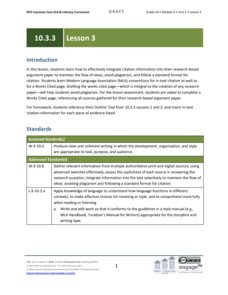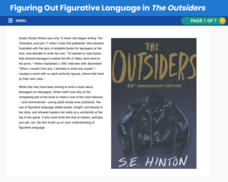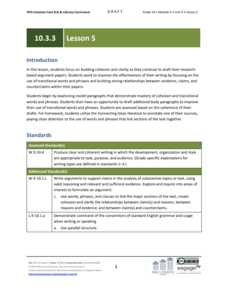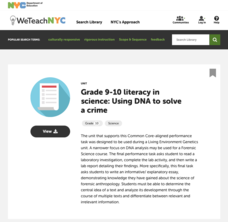EngageNY
Grade 10 ELA Module 3: Unit 3, Lesson 9
Let's join together and make a sentence. Scholars take the next step in revising their argumentative essays by combining independent clauses to make complex sentences. Writers use a Colon and Semicolon Handout to practice different ways...
EngageNY
Grade 10 ELA Module 3: Unit 3, Lesson 8
All is fair in claims and counterclaims. Scholars continue to work on their argumentative writing pieces by ensuring their papers fairly address claims and counterclaims. Writers review the importance of argumentative writing conventions...
EngageNY
Grade 10 ELA Module 3: Unit 3, Lesson 11
It's time to show what you know. Scholars finalize their argumentative essays by making last-minute revisions to conventions, tone, and formal style. Learners review the checklist to ensure they have met all the task requirements. They...
EngageNY
Grade 10 ELA Module 3: Unit 3, Lesson 7
What's your style? Writers examine wording to add formal style and objective tone to their argumentative papers. After looking at examples of sentences, learners use turn and talk to discuss which sentences have a formal style before...
EngageNY
Grade 10 ELA Module 3: Unit 3, Lesson 6
And that's a wrap! Scholars create their concluding statement drafts by examining model text with exemplar conclusions. In pairs, they discuss how transitional words and phrases add to sentence structure and consider how their concluding...
EngageNY
Grade 10 ELA Module 3: Unit 3, Lesson 4
Always try to make an excellent first impression. As scholars begin to write their argumentative essays, they learn the importance of a good introduction. Writers also begin to add in-text citations to their papers. After reading a model...
EngageNY
Grade 10 ELA Module 3: Unit 3, Lesson 3
Who said that? Scholars now learn how to cite evidence, give ideas proper credit, and work to understand the meaning of plagiarism. Part of the activity includes looking at an MLA Citation handbook, handy when pupils create their works...
EngageNY
Grade 10 ELA Module 3: Unit 3, Lesson 2
Put yourself in my shoes! Scholars work through the Outline Tool from the previous lesson to develop a claim before developing a counterclaim about selling human tissue. Learners also create supporting claims using an outline tool. For...
EngageNY
Grade 10 ELA Module 3: Unit 3, Lesson 1
Human tissue for sale or rent? Scholars refer back to articles they read in the previous unit and make a claim as to whether they believe it's okay to sell human tissue. Learners talk with partners, complete an outline tool, and collect...
PBS
A Time and Place: The Importance of Setting in To Kill a Mockingbird
A strong community acts as a family during difficult times. The evidence for the family aspects of Maycomb is abundant in Harper Lee's To Kill a Mockingbird, and it is the focus of a lesson on the importance of setting as it relates to a...
PBS
Figuring Out Figurative Language in The Outsiders
S.E. Hinton's The Outsiders is well known for its relatable characters and plot, but don't forget how effective the book's figurative language can be! Check out an interactive resource that explores how figurative language comes alive...
Digital Public Library of America
Teaching Guide: Exploring To Kill a Mockingbird
Harper Lee's To Kill a Mockingbird, considered by many to be a seminal piece of American literature, contains many complex literary themes that carry through United States history. Use a series of discussion questions and classroom...
EngageNY
Grade 10 ELA Module 3: Unit 3, Lesson 5
Can you please clarify? Scholars continue to work on their argumentative essays about selling human tissue by clarifying and adding cohesion. Writers begin by looking at model paragraphs and then begin improving their writing. They...
PBS
Latino Americans: Timeline of Important Dates
From 1500-2000, an interactive timeline details important events related to Latino Americans. Next, to each date are small, yet informative blurbs—some of which include videos.
New York City Department of Education
Grade 9-10 Literacy in Science: Using DNA to Solve a Crime
Scholars become detectives and use science to solve a crime! A complete unit introduces DNA and includes hands-on activities that have learners model DNA and extract it from different food types. A culminating activity challenges...
Odell Education
Making Evidence-Based Claims: Grade 9
Sorry, Charlie. Scholars take a close look at Apology by Plato. Activities analyzing the text help pupils understand, make, organize, and write about claims. Learners work in groups, complete claim tools, and evaluate thinking by filling...

















